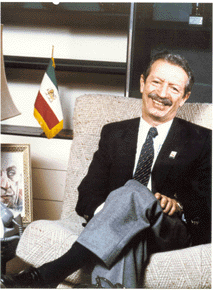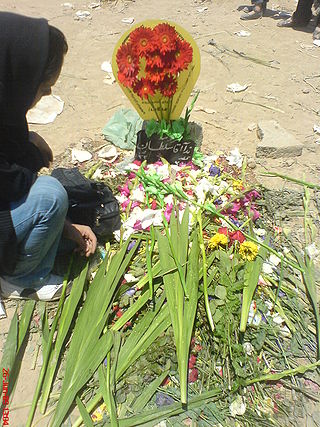
Shapour Bakhtiar was an Iranian politician who served as the last Prime Minister of Iran under the rule of Mohammad Reza Pahlavi. In the words of historian Abbas Milani: "more than once in the tone of a jeremiad he reminded the nation of the dangers of clerical despotism, and of how the fascism of the mullahs would be darker than any military junta". In 1991, he and his secretary were murdered in his home in Suresnes, France, by agents of the Islamic Republic.
Baháʼís are persecuted in various countries, especially in Iran, where the Baháʼí Faith originated and where one of the largest Baháʼí populations in the world is located. The origins of the persecution stem from a variety of Baháʼí teachings which are inconsistent with traditional Islamic beliefs, including the finality of Muhammad's prophethood, and the placement of Baháʼís outside the Islamic religion. Thus, Baháʼís are seen as apostates from Islam.

Starting on 19 July 1988 and continuing for approximately five months, a series of mass executions of political prisoners ordered by Ayatollah Khomeini and carried out by Iranian officials took place across Iran. Many prisoners were also tortured. The killings took place in at least 32 cities across the country. The killings were perpetrated without any legislative basis and trials were not concerned with establishing the guilt or innocence of defendants. Great care was taken to conceal the killings, and the government of Iran currently denies their occurrence.
Capital punishment is a legal penalty in Iran. The list of crimes punishable by death includes murder; rape; child molestation; homosexuality; drug trafficking; armed robbery; kidnapping; terrorism; burglary; incest; fornication; adultery; sodomy; sexual misconduct; prostitution; plotting to overthrow the Islamic government; political dissidence; sabotage; arson; rebellion; apostasy; blasphemy; extortion; counterfeiting; smuggling; recidivist consumption of alcohol; producing or preparing food, drink, cosmetics, or sanitary items that lead to death when consumed or used; producing and publishing pornography; using pornographic materials to solicit sex; capital perjury; recidivist theft; certain military offences ; "waging war against God"; "spreading corruption on Earth"; espionage; and treason. Iran carried out at least 977 executions in 2015, at least 567 executions in 2016, and at least 507 executions in 2017. In 2018 there were at least 249 executions, at least 273 in 2019, at least 246 in 2020, at least 290 in 2021, at least 553 in 2022, at least 834 in 2023, and at least 226 so far in 2024. In 2023, Iran was responsible for 74% of all recorded executions in the world.

Ahmad Batebi is an Iranian activist who was designated a prisoner of conscience by Amnesty International. During his studies at the University of Tehran he gained international fame for his appearance on the July 17, 1999, cover of The Economist magazine, holding up a shirt splattered with the blood of a fellow protester.

Clotilde Reiss is a French student accused of being an agent of a French intelligence agency. Her arrest in Iran on espionage charges on 1 July 2009 generated considerable diplomatic controversy. She holds a master's degree from Sciences-Po Lille. At the time of her arrest, she was teaching in Isfahan and writing a master's thesis about teaching history and geography in Iranian schools.

Ehsan Fatahian, was a Kurdish activist, who was executed on Wednesday, November 11, 2009, in Sanandaj Central Prison, after being sentenced to death by the Judiciary of the Islamic Republic, for allegedly being a member of the armed wing of Komalah. He was 28 years old.

The Mourning Mothers are a group of Iranian women whose spouses or children were killed by government agents in the protests following the disputed Iranian presidential election of 2009. The group also includes relatives of victims of earlier human rights abuses, including mass executions during the 1980s. The principal demand of the Mourning Mothers is government accountability for the deaths, arrests, and disappearances of their children. The mothers meet on Saturdays in Laleh Park in Tehran, and are often chased by the police and arrested.
Gamishli Yelqi is a village in Gorganbuy Rural District, in the Central District of Aqqala County, Golestan Province, Iran. At the 2006 census, its population was 1,466, in 324 families.
Rowshan Kuh is a village in Garmab Rural District, Chahardangeh District, Sari County, Mazandaran Province, Iran. At the 2006 census, its population was 34, in 15 families.
Faramarz Vakili, is an Iranian director, writer and producer. He was born in 1987 and started his filmmaking career in 2004 first with a few successful documentaries such as Cats and Men, Pardon me, Pahlevan Alimirza and The Melody of Life. Then he came toward docudrama and made a short docudrama in 2010 titled No Entrance.
Capital punishment in Bangladesh is a legal form of punishment for anyone who is over 16, however in practice it would not apply to people under 18. Crimes that are currently punishable by death in Bangladesh are set out in the Penal Code 1860. These include waging war against the State, abetting mutiny, giving false evidence upon which an innocent person suffers death, murder, assisted suicide of a child, attempted murder of a child, and kidnapping. The Code of Criminal Procedure 1898 provides that a person awarded the death penalty "be hanged by the neck until he is dead." For murder cases, the Appellate Division requires trial courts to weigh aggravating and mitigating factors to determine whether the death penalty is warranted.

Mohammad Ali Vakili is an Iranian journalist and reformist politician who was a member of the Parliament of Iran representing Tehran, Rey, Shemiranat and Eslamshahr electoral district.
Reza Alijani is an Iranian journalist, writer and nationalist-religious activist.
The Iran women's national 3x3 team is a national basketball team of Iran, administered by the Islamic Republic of Iran Basketball Federation.
Iranian Kurdistan or Eastern Kurdistan is an unofficial name for the parts of northwestern Iran with either a majority or sizable population of Kurds. Geographically, it includes the West Azerbaijan Province, Kurdistan Province, Kermanshah Province, Ilam Province and parts of Hamadan Province and Lorestan Province.
Capital punishment in Myanmar is a legal penalty. Myanmar is classified as a "retentionist" state. Before 25 July 2022, Myanmar was considered "abolitionist in practice," meaning a country has not executed anyone in the past ten years or more and is believed to have an established practice or policy against carrying out executions. Between 1988 and 2022, no legal executions were carried out in the country. In July 2022, four democratic activists, including Zayar Thaw and Kyaw Min Yu, were executed.
Majidreza Rahnavard was the first person executed in public for charges stemming from his involvement in the Mahsa Amini protests. Rahnavard was accused of fatally stabbing two Basij militia guards during a protest in November 2022, leading to him being charged with, convicted of, and sentenced to death for moharebeh. Rahnavard's execution occurred four days after the first protest-related execution, that of Mohsen Shekari.






